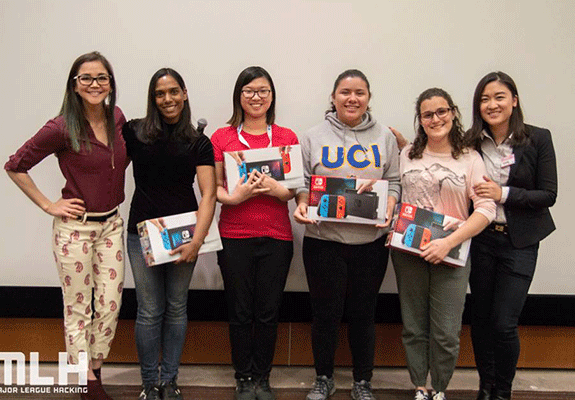Hacking a Solution
 May 2, 2018 - Four determined UC Irvine undergraduate engineering students took a promising idea, lots of stamina and the will to succeed to a local hackathon, and they emerged 24 hours later with a top prize.
May 2, 2018 - Four determined UC Irvine undergraduate engineering students took a promising idea, lots of stamina and the will to succeed to a local hackathon, and they emerged 24 hours later with a top prize.
The four-woman team designed and built a campus security system called WatchDog. Their award-winning prototype encompasses an app that can quickly summon police, along with a quadcopter that dispatches simultaneously to the scene, barks like a dog to scare off assailants and records video. The team won the Best Big Data Hack prize, sponsored by Neudesic, at AthenaHacks, held in February at the University of Southern California.
Team members Farah Arabi, Onalli Gunasekara, Kelly Hong and Floranne Ellington conceived WatchDog because they often work late in campus labs and were uncomfortable walking home alone after dark.
The four arrived at the hackathon with nothing more than the seed of an idea and a suitcase packed with supplies. They coded through the night; designed, soldered and programmed the quadcopter (even dashing to Target for additional necessities); set up the flight controller; and tested, refined and retested the communication signal between the app and the Raspberry Pi single-board computer right up until the final deadline.
When their team’s name was called during the awards ceremony, they sat, stunned, until they heard it a second time. “We were like, wait… what?” says Hong, an electrical engineering major.
WatchDog builds on UCI’s Emergency Blue Light system, a network of 150 emergency phones installed around campus. Currently, pedestrians needing help push a button on the emergency phone, which summons police. But the team envisioned a more sophisticated arrangement with a fleet of autonomous quadcopters encased in plastic housing, one of which sits atop each emergency phone. By using an Android app that incorporates GPS, those in need could summon police with a voice command, and simultaneously release the closest quadcopter from its housing, sending it to the caller’s location.
“The app can track your GPS location so even if you’re running away from someone, police will know where you are,” says electrical engineering major Arabi.
When police arrive, they can dismiss the drone, which would autonomously fly back to its home.
The students all had previous experience building quadcopters from their required freshman experiential learning class, and they expanded on that knowledge when constructing their prototype at the hackathon. “We realized that some materials are better than others so we brought electronic parts with us,” says aerospace engineering major Gunasekara.
The team, which is advised by Samueli School Dean Gregory Washington, plans to continue working on WatchDog. The young women hope to complete their prototype display by June when three of them will graduate (Ellington is the team’s sole junior). Their long-term goal is commercialization. “We are hoping to make a legitimate demo, something we can show to companies,” says Arabi.
“This is as committed a group of undergraduate students as I have ever seen,” Washington says. “In addition to being smart, they are driven, committed to the cause of expanding women in engineering, and are some the hardest workers in the lab.
“It’s been a joy to watch them mature, and their current project has real commercial potential,” he adds.
This year’s trip to AthenaHacks was actually the team’s second. Arabi, Gunasekara and Hong went last year, too, just to experience the event, a move they say helped them succeed this time.
For example, immediately following the opening ceremonies, the team dashed toward one of the few enclosed workspaces available to the entrants. “We knew from last year that if you run, you can get a study room,” says Gunasekara. “If you don’t run, you’re out in the open.”
“We ran for that room,” Arabi adds, laughing. “I think if we’d been outside we would have been more distracted.”
They were laser-focused on their goal, however. “This year, we said, ‘Ok, we’re gonna go, we’re gonna have an idea and we’re gonna win this,’” she says.
During the competition, the team divvied up responsibilities. Ellington worked on the app’s barking sound as well its communication functions. She also created the web page and helped design the logo with Hong, who focused on connecting the app with the communication protocol and the quadcopter.
Gunasekara did most of the coding on the quadcopter and took control of programming the Raspberry Pi, while Arabi focused on implementing the application programming interface and setting up the communication servers.
It was a grueling 24 hours. The women persevered, fortifying themselves with round-the-clock food, coffee and caffeinated chocolates. “There was a lot of adrenaline,” says Ellington, a computer engineering major, “and it was a lot of fun.”
For their winning effort, each team member won a Nintendo Switch gaming console.
“I still don’t know how we did it,” Arabi says. “I’m just really proud that we pushed through and honestly, really proud of our team. It was a great experience.”
- Anna Lynn Spitzer
